Supporting the mental health and well-being of seniors is crucial for enhancing their quality of life. Elderly individuals often face challenges such as depression, anxiety, and social isolation. Strategies like fostering social connections, promoting physical activity, and accessing mental health services can significantly improve their emotional state. Community programs and personalised care options further enhance cognitive engagement and reduce feelings of loneliness.
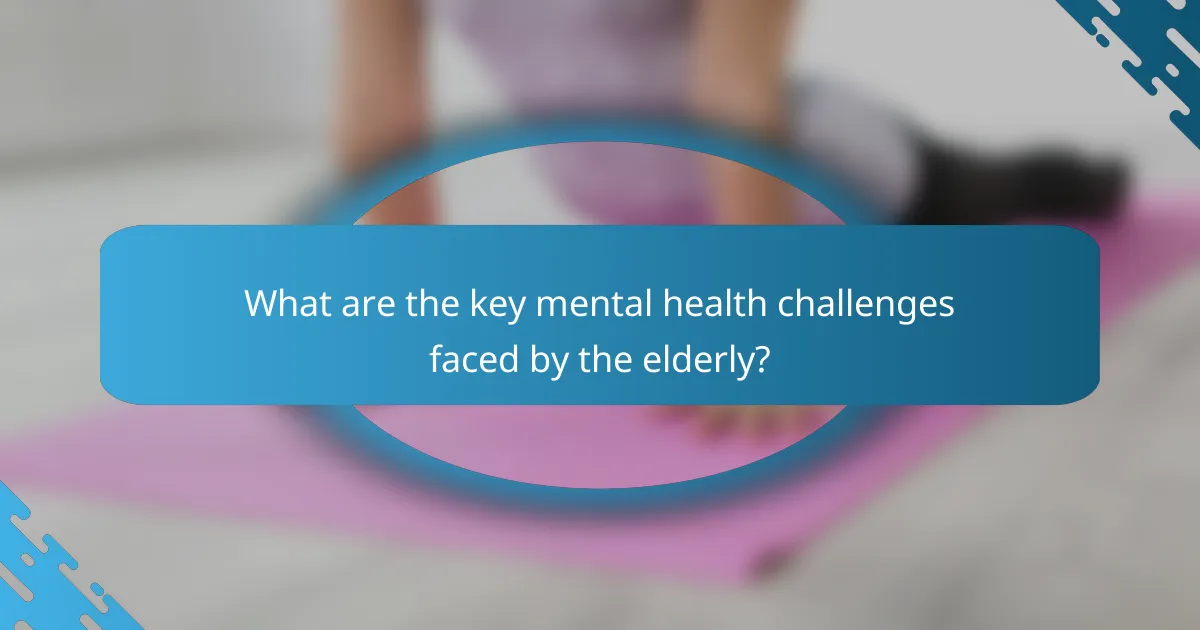
What are the key mental health challenges faced by the elderly?
Elderly individuals face key mental health challenges such as depression, anxiety, cognitive decline, and social isolation. These issues significantly affect their quality of life and overall well-being. Depression affects about 7% of older adults, often exacerbated by chronic illness and loss. Anxiety disorders can manifest due to health concerns and changes in lifestyle. Cognitive decline, including conditions like dementia, impacts memory and daily functioning. Social isolation, often stemming from loss of loved ones or mobility issues, leads to loneliness and further mental health deterioration. Addressing these challenges is crucial for enhancing seniors’ mental health and well-being.
How does social isolation impact mental well-being?
Social isolation negatively affects mental well-being by increasing feelings of loneliness and anxiety. Research shows that seniors experiencing social isolation are more likely to suffer from depression and cognitive decline. Engaging in social activities can enhance their mental health and overall quality of life. Programs that encourage interaction among seniors have proven effective in reducing isolation and improving emotional health.
What role does physical health play in mental health for seniors?
Physical health significantly influences mental health in seniors. Regular physical activity enhances mood, reduces anxiety, and promotes cognitive function. Studies show that seniors engaging in exercise experience a 30% reduction in depressive symptoms. Additionally, proper nutrition supports brain health, further improving emotional well-being. Maintaining physical health through these means is essential for fostering mental resilience in older adults.
How can cognitive decline affect emotional stability?
Cognitive decline can negatively impact emotional stability by reducing the ability to process emotions and maintain relationships. This decline often leads to increased anxiety and depression among seniors. Studies show that emotional disturbances can exacerbate cognitive issues, creating a feedback loop that worsens both conditions. Addressing mental health through supportive interventions is crucial for maintaining emotional well-being in older adults.
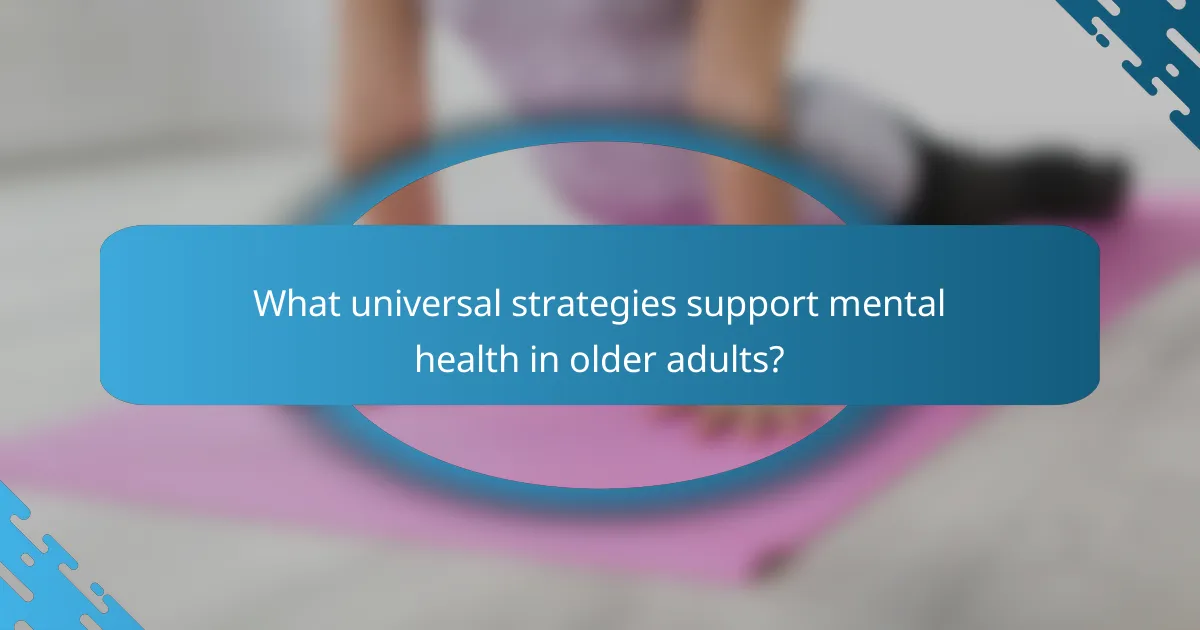
What universal strategies support mental health in older adults?
Universal strategies that support mental health in older adults include fostering social connections, promoting physical activity, and ensuring access to mental health services. Engaging in regular social interactions can reduce feelings of loneliness and depression. Physical exercise has been shown to enhance mood and cognitive function. Access to mental health resources, including counselling and support groups, is crucial for addressing emotional challenges.
How can community engagement enhance mental well-being?
Community engagement significantly enhances mental well-being by fostering social connections and a sense of belonging. Participating in community activities can reduce feelings of isolation, improve mood, and promote a supportive environment. Engaging with others through volunteering or local events provides opportunities for meaningful interactions, which can boost self-esteem and overall mental health. Studies indicate that individuals involved in community initiatives report higher levels of happiness and life satisfaction, reinforcing the importance of social ties in mental well-being.
What are effective communication techniques for supporting seniors?
Effective communication techniques for supporting seniors include active listening, clear speech, and non-verbal cues. Active listening fosters trust and understanding, allowing seniors to express their needs. Clear speech, avoiding jargon, ensures comprehension. Non-verbal cues, such as eye contact and gestures, enhance connection and convey empathy. These techniques support mental health and well-being by creating an inclusive environment.
How does routine and structure benefit mental health?
Routine and structure significantly enhance mental health by providing stability and predictability. They help reduce anxiety, improve mood, and foster a sense of control. Engaging in consistent daily activities can lead to better emotional regulation and social connections, which are vital for overall well-being. Studies show that individuals with structured routines experience lower levels of stress and higher life satisfaction.
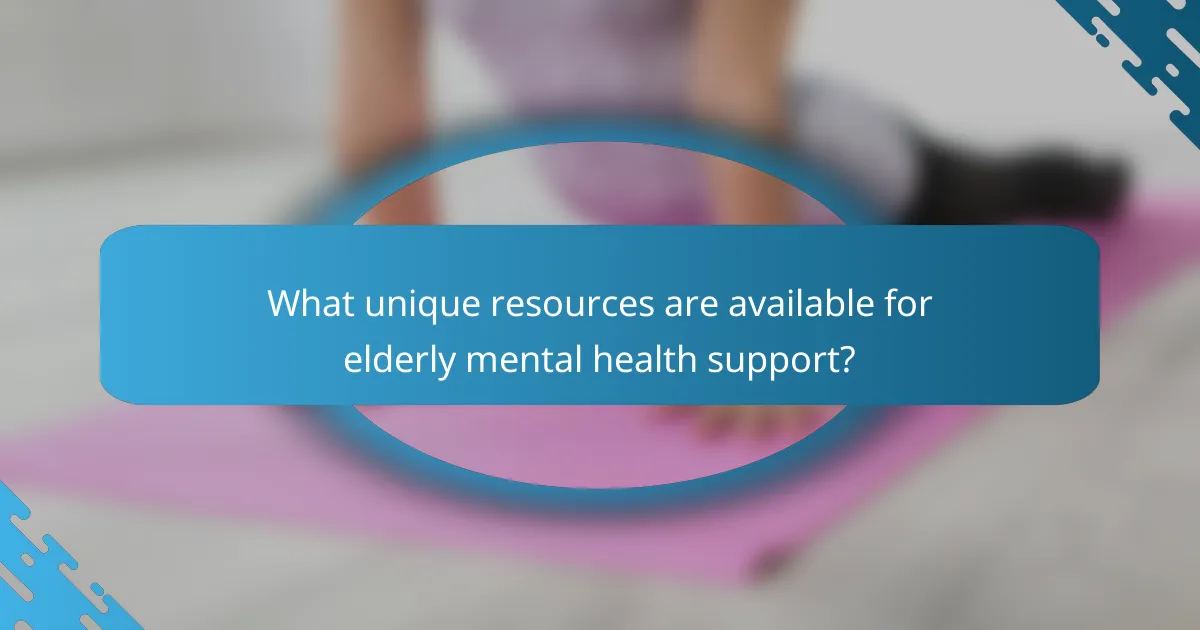
What unique resources are available for elderly mental health support?
Community programs, therapy options, and online resources uniquely support elderly mental health. Local organisations often provide tailored workshops focusing on cognitive engagement and emotional well-being. Telehealth services offer convenient access to licensed therapists, ensuring consistency in care. Additionally, support groups foster social connections, reducing feelings of isolation among seniors.
What role do therapy animals play in mental health support?
Therapy animals significantly enhance mental health support by providing companionship and emotional comfort. They reduce anxiety, improve mood, and foster social interactions. Studies show that interactions with therapy animals can lower cortisol levels, leading to decreased stress. Unique attributes include their ability to connect with individuals who may struggle with traditional therapy methods, making them invaluable in various settings.
How can technology facilitate mental health care for the elderly?
Technology can significantly enhance mental health care for the elderly by providing accessible support and resources. Telehealth services enable remote consultations with mental health professionals, reducing barriers to access. Mobile applications offer tools for mood tracking, cognitive exercises, and mindfulness practices, promoting daily mental well-being. Virtual support groups foster social connections, combating loneliness among seniors. Wearable devices can monitor health metrics, alerting caregivers to potential issues. These innovations empower older adults to manage their mental health proactively.
What are the benefits of telehealth services?
Telehealth services enhance access to healthcare, improve convenience, and reduce costs. They offer timely consultations, especially for seniors, promoting mental health and well-being. Telehealth also enables regular monitoring of health conditions, fostering proactive care. Additionally, it provides privacy and comfort, allowing patients to receive care in familiar environments.
What specialized programs exist for seniors with dementia?
Specialised programs for seniors with dementia include memory care facilities, adult day programs, and in-home support services. These programs focus on enhancing cognitive function and providing social interaction. Memory care facilities offer structured environments tailored to dementia needs, while adult day programs provide respite for caregivers and engagement for seniors. In-home support services deliver personalised care, ensuring safety and comfort. Each program aims to improve overall well-being and maintain independence.
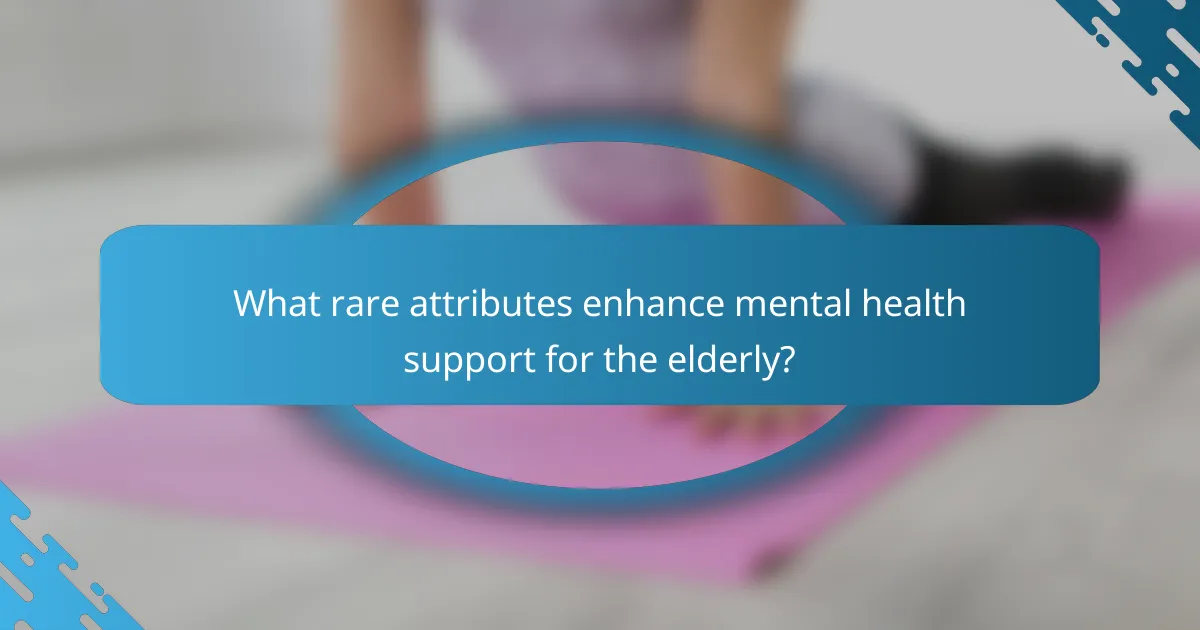
What rare attributes enhance mental health support for the elderly?
Social engagement, cognitive stimulation, and personalised care are rare attributes that significantly enhance mental health support for the elderly. These elements foster a sense of belonging and purpose, reducing feelings of isolation. For example, community programs that encourage interaction can lead to improved emotional well-being. Additionally, tailored mental health services that address individual needs can enhance coping strategies, promoting resilience in seniors.
How can art therapy uniquely benefit seniors?
Art therapy uniquely benefits seniors by enhancing emotional expression and cognitive function. It fosters social interaction, reducing feelings of isolation. Engaging in creative activities can improve mood and alleviate symptoms of anxiety and depression. Additionally, it offers a non-verbal outlet for those with communication challenges, promoting overall mental well-being.
What impact does volunteering have on mental health among seniors?
Volunteering positively impacts mental health among seniors by enhancing social connections and providing a sense of purpose. Engaging in community service can reduce feelings of isolation and depression, leading to improved emotional well-being. Research indicates that seniors who volunteer report higher life satisfaction and lower stress levels. Additionally, volunteering fosters cognitive engagement, which can help maintain mental acuity as one ages.
How can intergenerational programs support elderly mental well-being?
Intergenerational programs enhance elderly mental well-being by fostering social connections and reducing loneliness. These initiatives encourage meaningful interactions between seniors and younger generations, promoting mutual understanding and support. Studies indicate that participation in such programs can lead to improved mood and cognitive function among older adults. For instance, a program involving shared activities like storytelling or gardening has shown to decrease feelings of isolation and increase life satisfaction.
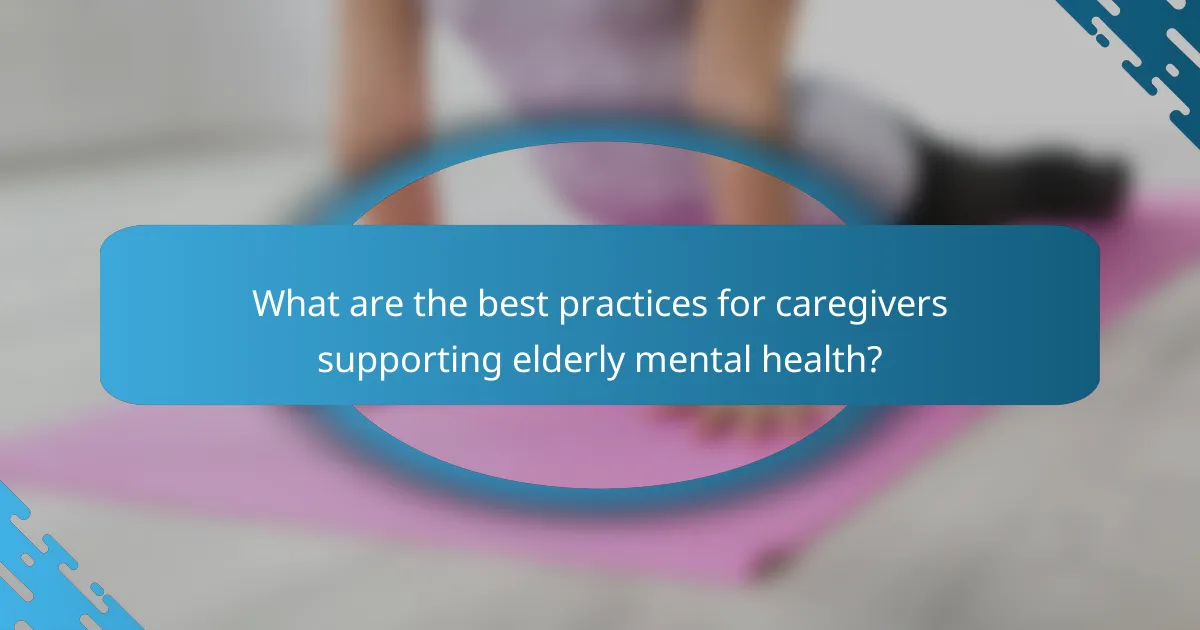
What are the best practices for caregivers supporting elderly mental health?
Caregivers can support elderly mental health by fostering social connections, encouraging physical activity, and providing cognitive stimulation. Regular interaction reduces feelings of isolation, while exercise enhances mood and cognitive function. Activities like puzzles or reading promote mental engagement. Monitoring medication adherence is crucial for overall well-being.
How can caregivers effectively reduce stress levels in seniors?
Caregivers can effectively reduce stress levels in seniors by fostering social connections, encouraging physical activity, and promoting relaxation techniques. Engaging seniors in community activities enhances their emotional well-being. Regular exercise, tailored to their abilities, boosts mood and reduces anxiety. Techniques such as deep breathing and mindfulness help seniors manage stress effectively.
What common mistakes should caregivers avoid?
Caregivers should avoid several common mistakes to ensure effective support for seniors. Failing to communicate clearly can lead to misunderstandings and frustration. Ignoring the individual needs and preferences of seniors may result in decreased mental well-being. Over-scheduling activities can cause stress, while neglecting self-care can lead to caregiver burnout. It is essential to maintain patience and empathy in all interactions to foster a supportive environment.
How can caregivers create a supportive environment?
Caregivers can create a supportive environment by fostering open communication and emotional safety. This involves actively listening to seniors, validating their feelings, and encouraging social interactions. Providing a structured routine enhances stability, while incorporating engaging activities promotes mental stimulation. Additionally, ensuring a comfortable physical space with accessibility features supports independence.
What are the key takeaways for enhancing mental health support for seniors?
Enhancing mental health support for seniors involves tailored programs, community engagement, and accessible resources. Key takeaways include promoting social interaction, providing mental health education, and ensuring access to professional help. Regular activities that foster connection can significantly reduce feelings of isolation. Additionally, training caregivers in mental health awareness enhances support systems. Lastly, integrating technology can facilitate communication and access to mental health resources, making support more effective.